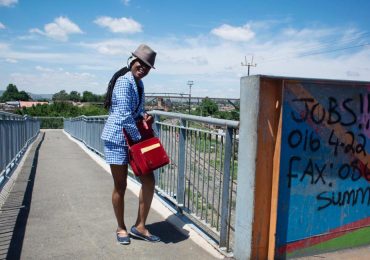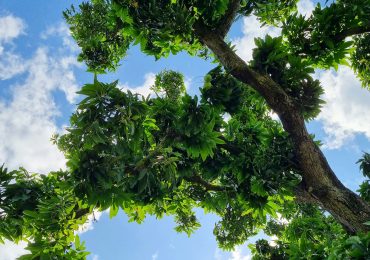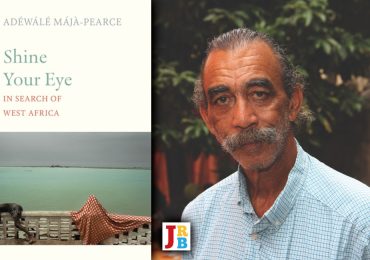Header image (left to right): Nozizwe Cynthia Jele, Niq Mhlongo, Siyamthanda Skota, Yanele Nyamela, Phindile Mokoena, Outlwile Tsipane and Mũkoma wa Ngũgĩ in Lagos
My 2010 and 2018 visits to Nigeria are fundamental to my present understanding of what visa hassles are really like. No words, no matter how wise, can explain the awfulness of visa application processes. This does not apply to my Nigerian experience alone. My own country, South Africa, is also a nightmare. My point is: when you travel frequently, you become familiar with the scent of evil inside immigration offices. After my recent Nigerian experience, however, I have come to the conclusion that there are certain things in life that should be free to everyone—and one of these is the freedom to travel.
Rewind eight years. I’m due to fly to Lagos on 24 May 2010. I’ve been invited by Chimamanda Ngozi Adichie to participate in the Farafina Trust Creative Writing Workshop. The workshop will run from 20 to 29 May, but I’m only joining on the 25th. It features such authors as Chika Unigwe, Binyavanga Wainaina, Adichie herself and a very special guest of honour: Mama Ama Ata Aidoo. I’m to be one of the facilitators.
A few days before I fly to Lagos, I’m faced with a visa dilemma. I have only twenty-four hours to solve it, or else I’m not going to Nigeria. This is how it happens.
I applied for my visa online on 4 May. I paid 58 US dollars and sent my passport to the Nigerian Consulate General in Illovo, Johannesburg, as required. Two weeks have passed and I haven’t heard anything from the consulate. Panicking, I call them. I’m told there are some outstanding documents I have to send in before my visa application will be successful. ‘Why tell me this only now?’ I ask myself. I feel hope draining and a sudden pounding of my heart.
On Tuesday, 18 May, I pay the Consulate General a visit. Behind the counter is a tall man. He has twinkling, mischievous eyes, but his face seems to deliver a warning when he talks.
‘You have to pay R7,000 for the repatriation fee,’ he tells me.
‘What does repatriation fee mean?’ I ask.
He frowns as though my question does not make any sense. ‘That’s the money you pay when you visit Nigeria for the first time. Your application will take seven days to be processed after paying the money. The application office opens twice a week, on Tuesdays and Thursdays. So you can come again on Thursday with the money.’
Despite the unbearably warm and dry air in the office, his words make for ice in my veins. Anger begins pushing up my gullet, and I want my chest to burst open to drain the poison and ease the pain. ‘What do I do now?’ I ask myself.
I have a Nigerian friend called Esupofo. He lives in Braamfontein and owns an internet cafe business. I decide to find out from him if he can rescue my trip. Esupofo has a plan, but it’s an expensive one. We drive back together to meet the security guard who works at the embassy. His name is Sithe, and he’s from Zimbabwe. Sithe demands R2,500 and says he can fix my visa in two hours while I wait. He assures me that together with his colleague George from Diepkloof, Soweto, he has ‘an inside connection with the big general’.
I need the visa badly, but I’m not sure whether I should risk such an amount with a security guard. I want some form of a proof that Sithe is not going to disappear with my money. His only proof is to show me R25,000 cash rolled up in his pockets.
‘Look my friend,’ he says. ‘This belongs to the general in the embassy. It’s from the people like you that have applied for the visa through me. The general will collect his money at the end of his shift.’
Sithe can see that I’m still doubtful. He asks for my cell phone to call ‘the general’. He hands the phone back to me, and the general is warm, responsive and receptive when I tell him about the urgency of my visa.
‘Stop worrying,’ he says. ‘Your visa will be ready in less than two hours. You can wait there for me if you want.’
After some more hesitation, and encouragement from Esupofo, I decide to take a chance. I give Sithe the money and my declined online application number. I take down his security company name and his contact details.
We decide to drive to Rosebank Mall to kill the time with a few beers at Nino’s. After about an hour and half of nervous waiting, my phone rings. Sithe is on the line.
‘Heita. Your visa is ready.’
Relieved and happy, we immediately drive back to Illovo. I have been given thirty days to stay in Nigeria, and the stamp says I’ve paid 58 USD.
Fast forward eight years, to 24 October 2018, and I’m on my way to Lagos again. To my relief, this time my host, the Aké Arts and Books Festival, has arranged a visa on arrival for me. At the airport in Lagos, I need only to produce a visa approval letter from Aké, my passport, a copy of my return flight, and two recent passport-sized photographs. The visa costs 58 USD, according to their website. However, we’re advised to carry a few more dollars in case we are requested to pay more. The festival will reimburse all our expenses, we must just keep the receipts.
My RwandAir flight leaves at 2.30 am on the 24th. The afternoon before, Cynthia Jele, Outlwile Tsipane, Zandile Makhaya, Phindile Mokoena and I are discussing our impending journey. Zandile and Phindie are representing Bafati Bebumbene Book Club, and Aké has included them on the visa-on-arrival documents for immigration purposes.
But there’s one big mistake we’re making. We’re all convinced that we have plenty of time to prepare for this trip. We have not done our passport photos or printed the required documents for the immigration office in Nigeria. It’s only at about 7 pm that I realise with an explosive shock that we’re supposed to be at the airport within five hours. I start making calls to Cynthia and Outlwile, but can only get hold of the latter. Cynthia’s phone is off—I’m not aware that she is flying back from Cape Town. I leave an urgent message, reminding her that she has to be at the airport by twelve.
Outlwile fetches me in Soweto at 10 pm. We’re hoping to organise our passport photos and other printouts at the airport. But since I packed in such a hurry I realise I’ve forgotten my yellow fever card. We make a U-turn at Gold Reef City, back to Soweto to collect it.
When we get to OR Tambo, most of the shops are closed. We manage to get our return tickets printed at the RwandAir desk, but our worries are the passport photos and also changing rands into dollars, which we were unable to do.
We board the ten-hour RwandAir flight, which has a stopover in Kigali. The plane touches down in Lagos just after noon local time. I feel the weight of anxiety sweeping through me. At the first gate, two officers inspect our yellow fever cards and shine some kind of torch in our ears. We all pass through without a problem except for Phindile. She is told that her yellow fever card is too new. It should’ve been done at least ten days before the trip. A R50 bribe to the officer saves her from being delayed.
The Aké Festival has organised an airport protocol officer to take us to the visa-on-arrival office. He is wearing a uniform and looks like he is working at the airport. The office is very small, and inside there are about five immigration officials and about a dozen passengers from earlier flights. They are all sharing a fan that sits on a table. The majority of the passengers have done the visa payment online. But it’s evident that they’ve been there for hours, as they sit in subdued silence, with bowed heads.
Three women who were on the plane with us show the officers the receipts of their online visa application. They are told to start the process afresh and pay 90 USD in cash. An American women that we found in the office tries to reason with them by also showing her receipt. But the officers are having none of her story. She sits with her body bent forward as if she has a stomach ache. Incredulity, contempt, sadness and anger all seem to converge in the expressions on the visitor’s faces. But the only protests are made in soft whispers.
After a time a friendly officer comes to collect our passports, but everything is being done manually. Priority is given to those who have cash, and by cash they mean American dollars only, not naira. Those of us wanting to swipe our bank cards have to pay 78 USD, but we are told we will have to wait because the system is offline. The officer writing down names is taking his time, processing one passport in roughly twenty minutes.
The heat is intense and stifling. I visit the toilet twice and witness dollars openly exchanging hands between the officers. The time ticks away very slowly. Every thirty minutes more passengers arrive, filling the office. Those of us without American dollars in our pockets, our eyes become a hard, blank, uncommunicative stare. Our thoughts and feelings are strictly private and never shared.
Then an incident occurs. Our frustrated airport protocol officer starts muttering with great bitterness about how the office has become too slow. Ugly words start to explode between him and the immigration office manager, burning and smoking in the hot air right up to where we’re sitting. With the support of other officers, the manager oga seizes our protocol officer by the collars of his uniform and rips his badge off.
‘You’re dismissed! You’re fired! You’re a disgrace to Nigeria! You’re unpatriotic! How dare you disrespect the nation in front of foreigners?’ he yells.
The gesture is sudden and unexpected, but the assembled visitors merely stir uncomfortably and stifle gasps of surprise. I watch the manager’s Adam’s apple bob up and down wildly as he swallows saliva. It’s as if his throat is in protest against swallowing. Phindile, Cynthia and Zukiswa Wanner (who we met up with at Kigali Airport) pretend they are not hearing anything. Their faces are buried in the books they are reading to cushion them against some of the disappointment and anger.
Our visa problem is finally solved at 5.40 pm, when we are informed that we can use our bank cards to pay the 78 USD. The visa stamps on our passports only reflect 58 USD. But who are we to question? Not all of us have the same experience. For the Kenyan passport holders it’s a smooth process. They only pay 20 USD. For Batswana it’s more than a hundred dollars. For the Americans it is 90 USD, but that excludes a bribe that they still have to pay.
Outside the airport building, I decide that immigration officials on this continent are traitors to the African cause. It’s not only in Nigeria that I’ve witnessed this horror. It’s at Beitbridge, Lebombo, Nakonde—everywhere. It’s as though immigration officials are trained to see a suspicious character in every traveller. I’m enraged to the point that only a cold beer can calm my nerves. We get into a taxi to the hotel in Ikeja, Lagos, which throbs with the noise of life, the tumultuous clamour of the street.
- Niq Mhlongo is City Editor; his latest book is an anthology of short stories, Soweto, Under the Apricot Tree. Follow him on Twitter.





